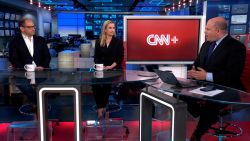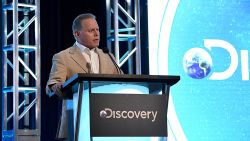There is reportedly a bidding war between a Hollywood heavyweight and a Silicon Valley giant, and it’s over one of the most popular creators in film and TV: J.J. Abrams.
According to Variety, WarnerMedia and Apple (AAPL) are both looking to strike a deal with Abrams and his production company, Bad Robot, that would include “films, television, digital content, music, games, consumer products, and theme-park opportunities.” The deal, which could happen early this summer, may be valued at close to half a billion dollars, according to Variety.
That price may seem high, but it makes sense given Abrams’ resume and his knack for reviving franchises. He has directed two “Star Wars” films, two “Star Trek” films and “Mission: Impossible III.” He’s also produced hit TV shows like HBO’s “Westworld” and ABC’s “Lost.”
“He creates some of the world’s greatest film and television content,” BTIG media analyst Rich Greenfield told CNN Business. “Hollywood has always wanted to lock up great producing and directing talent.”
The Variety report could not immediately be verified by CNN Business. Both WarnerMedia and Apple declined to comment for this report.
The introduction of new streaming options means that the companies behind them are rushing to sign the best talent who can create the kind of content that entices subscribers, according to Greenfield. Apple and WarnerMedia both have new services that are expected to debut later this year. (WarnerMedia is also the parent company of CNN.)
“Obviously, these companies want to build out their footprint in this market and franchises help do that,” Greenfield said. “J.J. has worked on some incredible franchises, so I think owning people that create sustaining franchises is important.”
Apple’s reasons for wanting Abrams would be pretty straightforward, said Neil Cybart, founder of Above Avalon, a website focused on analysis about the tech giant.
“Content,” Cybart said. “Look at Disney+, they have a huge catalog. Apple doesn’t have that. Apple is going with original content to build up Apple TV+ and they need people who are good storytellers and know how to make good content for that service.”
Disney’s streamer, Disney+, is launching in November and it will include content from its current library along with new exclusives that subscribers can’t find anywhere else.
Abrams is just the latest high profile producer to be courted for a huge production deal. Netflix poached producer Shonda Rhimes from ABC in 2017 for around $150 million, according to the New York Times. Then in 2018 it signed producer Ryan Murphy for up to $300 million.
So which company should Abrams choose? WarnerMedia or Apple?
A courtship like this isn’t just about who can write the bigger check. There are other factors that are appealing to a producer, and WarnerMedia and Apple are each uniquely positioned to lure Abrams with what they have.
For WarnerMedia, there’s a prestige factor, according to Greenfield.
“I mean it’s one of the most iconic studios in the world. They’re not on the level of Disney in terms of film, but they’re an industry leader in terms of television. J.J. loves to do TV,” he said. “WarnerMedia also has HBO, which speaks for itself.”
Greenfield added that Apple is “starting at zero” while Warner Bros. has been around since 1923. However, Apple has an “infinite checkbook and an incredible global brand,” he said.
Apple also has a huge audience. The company has 1.4 billion active iOS devices around the world.
“At the end of the day, creative artists want to have as many people as possible see their work,” Tim Bajarin, principal analyst at Creative Strategies, a tech research and consulting firm based in Silicon Valley, told CNN Business.
Apple could also bundle its service with video games via Apple Arcade and music via Apple Music. That could be very intriguing to Abrams, since Bad Robot is launching an indie music label and a video game division.
Bajarin believes that no matter which company Abrams ultimately chooses, he really can’t go wrong.
“I don’t there’s a really big downside to working with one company or the other,” Bajarin said. “Both companies are extremely solid.”
























